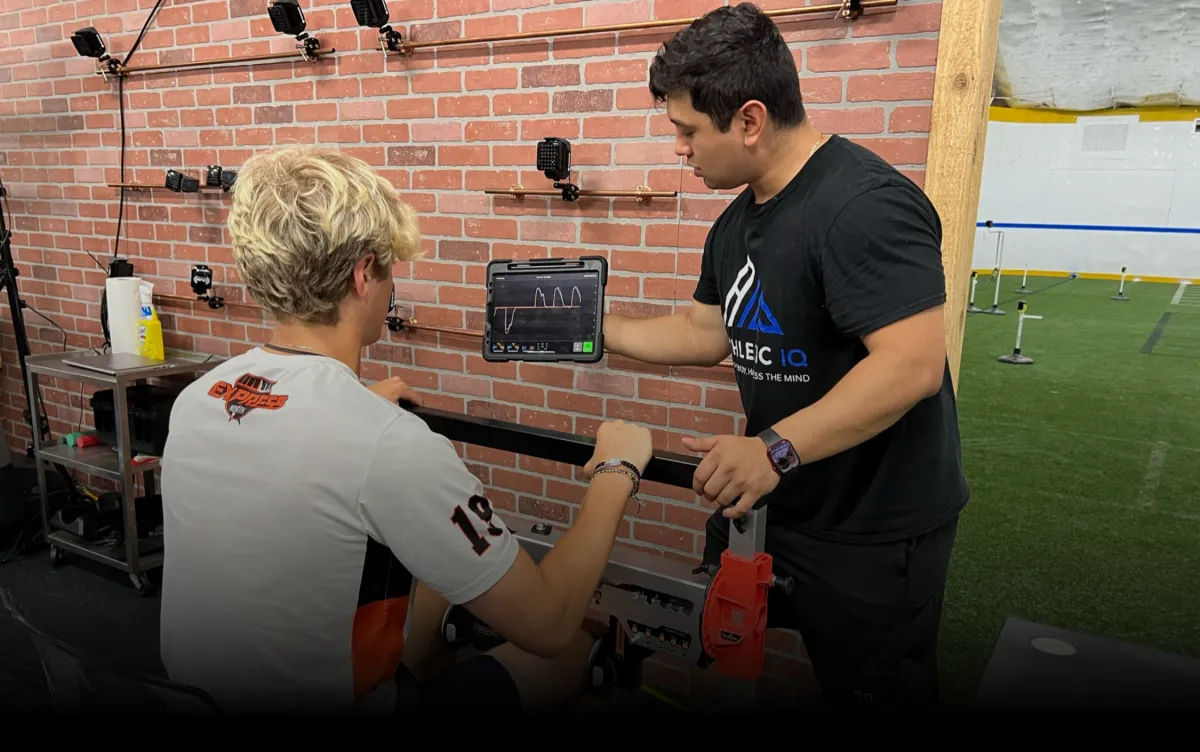111 Prospect Ridge,
Floor 2 Ridgefield,
CT 06877
111 Prospect Ridge, Floor 2, Ridgefield, CT 06877
The Coach-Led Center For Human Performance
Designed for Rapid Results
Our mission: To Train the Body, & Harness the Mind.

Adult Human
Transformation Program
Youth Peformance
Program
Biggest Hurdles:

Accountability
How we can help: Coach Led, Goal Oriented training with leading trainers. Daily tasks & objective performance tracking with weekly check-ins to monitor goals in progress.

Goal Setting
How we can help: We guide our client performance transformations by setting realistic, focused and sustainable milestones that help them achieve their intended goals.

Education
How we can help: We design a performance plan for a client of any age or ability. We take a holistic approach to training the mind & body that’s both effective and enjoyable.

Community
How we can help: Join a supportive community of like-minded individuals working towards their own performance transformation.
About Athletic IQ Lab
Everything you’ll need to transform, under one roof.
Our transformation program is tailored to each individual member. You will be paired with an expert coach that matches your style and needs. All ages, injury history, goals, fitness levels and experience are welcome!

Private Coaching
Let our coaches guide your performance journey. We focus on exactly what you need while keeping a close eye on your progress. Your coach will adjust your program as needed, keeping focus on the goal at hand.

Group Workouts
Performance Bootcamps, Strength and Conditioning, Speed and Agility, Cognitive Training, Kids Fundamentals Classes and more! We have classes to address all areas of performance, for all ages, so you can address your performance and fitness goals.

Nutrition Consulting
Healthy nutrition consulting to get you feeling and performing at your best.. We teach you how to balance healthy foods with everyday life and get you feeling great while you perform at your best. It doesn’t hurt to get leaner along the way.

Goal Setting and Tracking
It starts with establishing a baseline. Then weekly goal setting and tracking with your performance coach to hold you accountable. We know where you are starting from and where you want to get to, so let’s do it.

Specialty Programs
Sport Specific Programs, Athlete Assessments, Gait Analysis, Mindset Coaching, Recovery Massage and Nutrition so you’re equipped with everything you need to transform your body and mind.

Facility Rentals
Our 3,000+ sq/ft facility is available for a number of rental opportunities. We have pricing options available to rent our 2400 sq/ft of turf, or our (2) 12’x12’x55’ batting tunnels, or our 12’x78’ pitching lane, or our 36’x36’ wrestling mats, even a complete facility rental. Inquire for details!

Sport Rehabilitation
Our Physical Therapy team evaluates holistic factors that contribute to your condition like lifestyle, workplace and home environment, general health conditions, and your mindset. We aim to break everything down and get you back to what you love the most. We work to give you the knowledge and tools to sustain improvement as you make progress toward your long term goals, and help you to achieve a healthy body for life.
What Our Client Says:

"Not that long ago- I was humiliated to show my arms in public. I avoided it. Fast forward & I love to show them now. Call them manly, call them what you want--but I am damn proud of the work that I put in. I can't stress it enough-- IF I CAN DO IT, YOU CAN TOO!"
- Erin A


"I've been with BBD for 2 months and can't believe the difference the gym and most importantly, my coach, Tyler has made my life. I have more energy, I'm happier, I'm stronger and I'm at my lowest weight in years."
- Corrie M.


"Going to Body By Design is the highlight of my day. They created a custom vegetarian meal plan for me, and I love personal training with Gui along with the evening boot camp classes. I show up and do my best. It's a no judgement zone. Every trainer strives to give you personal attention."
– Kanchan R.


"Working out has easily been the most positive force in my life.Body By Design has given me critical human contact & social interaction when I struggled with extreme self-isolation and loneliness.This gym has given me an outlet- a place to get out of my head, connect with myself & be present.BBD has given me confidence, discipline, passion, and fulfillment, but most importantly the gym has been a constant which has made me who I am today."
– Natalie B.


"I was looking to change up my work out and break my plateau. Adam took time to learn my goals and my previous training and struggles.The difference between BBD and other gyms is it feels like you are part of a family. Each trainer makes you feel welcomed in the classes. The members are encouraging and I have become friends with several members. I've finally broken my plateau."
– Sharon R.


"Prior to coming to Body by Design, I was feeling unhappy, dissatisfied, and disappointed that I allowed myself to get to a point where I was unhealthy both physically and mentally. I would eat out and have cocktails with friends throughout the week. I thought I was happy and believed I was living my best life.Today, I feel great! I have learned to prioritize myself, well-being, and health. My journey is still going, as it should be, but I am happy and committed to my overall physical and mental health goals. I can now say I am living my best life!"
– Stephanie K.


Schedule the perfect day and time to come into the gym. You’ll meet with our program director for a 1 on 1 consultation. We make this super simple, don't sweat it

We’ll learn all about you, and you’ll learn about our us. We’ll discuss the Transformation Program that makes the most sense based on your goals.

Once we’ve put together the perfect Transformation Program for YOU, we’ll introduce you to your Transformation Expert Coach who will be with you every step of the way. Together, you’ll get started.
Client experience:
My son injured his hip last fall. He started seeing Mike and was able to rehab his hip and now is stronger and faster than before he was injured. Thank you to the doctors and trainers that were involved. I would highly recommend Athletic IQ Lab.
Anne Uecker
Great skill and movement training for LAX kids!
Renee Bonilla
Great training for my kids! Small classes and individual attention!
Danielle Scesa

Progression
How we can help: Around the clock communication with industry leading trainers. Daily tasks & weekly body scans to track progress.

Workout
How we can help: We guide clients towards a realistic balance for a sustainable, healthy lifestyle.

Nutrition
How we can help: Learn how to eat delicious foods while saving time, money, and getting results.
Hi! We're A Local Performance Center
Located in the heart of Ridgefield, CT. Serving Ridgefield, Wilton, Redding, Danbury, New Canaan, Katonah Lewisboro, North Salem and the surrounding areas.
Established in 2022, it’s our mission to help people in Ridgefield and the surrounding areas perform at their optimal level. While staying fit, healthy, and living life aligned with their goals and ambition.
Claim your 7 day free trial

I agree to terms & conditions and privacy policy provided by the company. By providing my phone number, I agree to receive text messages from the business.

FREQUENTLY ASKED QUESTIONS
How Much Are The Memberships?
Memberships at Athletic IQ Lab vary depending on the individual. Our Coach Led performance transformation programs can include group training, individual training, nutrition consulting, sport specific training, rehab, recovery, and more! Once we design the perfect program based on your goals and timeframe, we will go over the price.
Do I Have To Have Experience To Train At Athletic IQ Lab?
Not at all. Our programs are designed for beginners to advanced, for young and old and we’re with you every step of the journey!
Do I Have To Commit To A Long-Term Membership?
Absolutely not! The length of your membership is based on your goals and where you’re at now. 12 and 24 month memberships are NOT client-centric and our center is all about our clients and their success!
I Want To Transform My Performance, But I Don’t Know How To Get Started. Help!
We got you. We understand getting started is the hardest part. We’ll take it one step at a time. Step 1, come in for a “no sweat intro” and have a chat with us. No working out, no sales pitch, we’re just going to talk about your goals, that’s it. If you’re excited about what we talk about, we’ll move on to Step 2. No pressure, we’re coaches, and we’re here to help.
Ready To Get Started?
Discover How You Can Transform Your Body And Life With The Help Of A Transformation Expert Who Will Be With You Every Step Of Your Journey!
We KNOW You Have It In You! Will You Be Our Next Success Story?

Powerüft is a champ in providing its users with absolutely everything a fitness or gym site needs.
Our Socials:
YouTube
Important Links
Important Info
working hours
Monday — Friday:
07:00 - 21:00
Saturday:
07:00 -10:00
Sunday Closed
Important Info
working hours
By Appointment Only.
Staff Hours
Mon-Fri : 6am - 9pm
Sat - Sun : 9am-12pm


